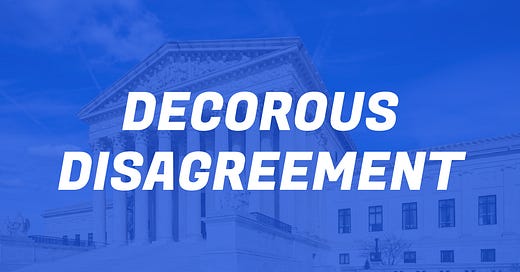Application Overview (prospective, pending enrollment)
Time: 11:00-12:30pm, Sundays: April 20, 27; May 4, 11 (4 weeks)
Location: Williamsburg
Prerequisites: None
Completion reqs: all homework (1-3 hours a week), no more than one absence
Tuition: $400. Give yourself whatever discount you when paying tuition.
Deadline: April 15 (5pm EST)
Class Details
You don’t have to have a bad time when discussing weighty public policy issues; in fact, you should avoid it whenever possible (and it’s usually possible).
That’s easy enough to say, and it’s even easy enough to accept intellectually. But it’s another thing to work out political differences with people in real life. People fear it, so they avoid it, so they remain unskilled and clumsy about it.
If you want to learn how to disagree in matters of politics and policy, and have an OK time, take this class. You’ll be learning from those who do this for a living: America’s Supreme Court justices.
How do you know if you’ll have a good time in this class? You’ve read this, and are fascinated.
What will you learn?
You’ll answer: How does the Supreme Court discuss the issues before it?
You’ll answer: How is legal disagreement different from everyday conversational disagreement?
How to read Court opinions
How to read the Constitution
What will you do?
You will discuss what court cases say.
You will argue the perspective of different justices—even if they come to conclusions you disagree with!
You will distinguish between what the law requires, and what is good (and against which standard).
You will never think about SCOTUS (or courts more broadly) the same again! And you’ll rarely take news headlines about their decisions at face value.
What are the prerequisites?
You don’t need any background in law to enroll in this class. You just need to be excited about disagreeing in a new and technically rigorous way! Bring curiosity, mental toughness, and a positive attitude. The class won’t always be socially easy, but it will be socially safe. You are encouraged to venture draft opinions, and do your best to inhabit the arguments of the justices (even if you disagree with them).
Class content
Duration: 4 weeks
While each class will revolve around at least one significant Supreme Court case, each class will discuss the much wider historical and legal context in which each case occurred.
An example slate of cases we’ll consider (actual cases will vary, depending on class size and interest):
Week 1:
Obergefell v. Hodges (2015) - gay marriage
Week 2:
Dobbs v. Jackson Women's Health Organization (2022) - abortion rights
Week 3:
Wickard v. Filburn (1942) - federal regulatory reach
Week 4:
National Federation of Independent Business v. Sebelius (2012) - the legality of part of the Affordable Care Act ("Obamacare")Class Expectations & Etiquette
MNY classes are open to anyone who wants to improve their own civic capacity. Maybe you want to get deeply involved in politics. Maybe you’re just intellectually curious. Maybe you’re somewhere in between. You’re welcome in any case.
The classroom environment I encourage is one of exploration, curiosity, playfulness, and charity/tolerance. You will disagree with others in this class, but perhaps not in the way you expect.
This class shares four formal rules of etiquette with all MNY classes:
Politics is a good word, and a potentially beautiful thing. We are here to learn how to do government and civics as friends, in a chill fashion, even while dealing with weighty issues.
No bullshitting, aka be concrete. We’re all here to learn together, but we’re doing it in a rigorous fashion. You must always strive to deeply understand the reality of governance that underpins your political thought.
Extend grace to everyone. We’re here to learn together. Government and politics are complicated fields, and no one knows everything. We will be better, together.
Find the good time. Taking things seriously does not mean being mad about them, although tempers might flare in this class in particular. The wider world can pressure people to get mad to prove that they take political ideas seriously. I do not equate anger with either sophistication or dedication, so I relieve you of that burden. Make jokes, be serious, push back, learn a lot. But give yourself (and others) a break while you’re in class.




